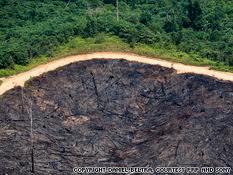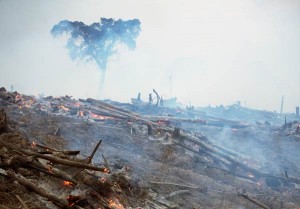
In response to Cargill’s recent announcement stating that they would ignore their promise to take action on widely known rainforest destroyer Sinar Mas, RAN sent out a press release calling Cargill out on failing to do the right thing. Both Reuters and Mongabay picked up the story.
PT SMART Audit in hand, Cargill ignores promise to take action on Sinar Mas
San Francisco – In the wake of an audit confirming accusations of environmental abuses by the controversial Indonesian palm oil supplier Sinar Mas, Cargill has announced a decision to continue business as usual relations with the disgraced palm oil provider. Posted only as an update to a section of their website, Cargill’s decision is an unexpected step after months of public expectation that the company would sever ties with the large Indonesian palm oil producer.
“It’s now clear that Greenpeace’s evidence against PT SMART was justified, and that Sinar Mas remains a controversial supplier,” said Ashley Schaeffer of Rainforest Action Network (RAN). “If this company actually believes that Sinar Mas’ palm oil is not destroying rainforests, Cargill can’t tell fact from fiction.”
As a result of an international Greenpeace campaign against Nestle, a Cargill palm oil customer, Cargill had promised to reevaluate their relationship with Sinar Mas in March 2010, a promise widely reported by the media. Cargill pinned their re-evaluation on a third party “independent verification report” of claims made by Greenpeace against the Sinar Mas’ PT SMART and Golden Agri Resources Limited Holdings regarding deforestation and destruction of orangutan habitat, clearing forests without permits, destroying peatland and causing social conflict. The investigation was conducted by two certification bodies, CUC (Control Union Certifications) and BSI (BSI Group). SMART released the verification report to the media on August 10, 2010, claiming that the findings exonerated them from all charges.

In a statement released on August 16, 2010, Cargill stated that the company is “satisfied that this has been an independent, detailed and thorough evaluation of the allegations,” and proclaims that they will continue to view PT Smart’s parent company, Golden Agri Resources as a partner in their quest for sustainable palm oil.
On August 19, 2010, however, PT SMART’s auditor BSI released their own statement, restating their findings because they said that, “there have been elements of the report that have been misreported as it has been published and presented.” The findings restatement confirmed that PT SMART had contravened the Principles and Criteria of the RSPO and failed to meet the legal requirements of Indonesian law. WWF, respected environmental group who is working with Cargill on their own palm oil supply chain audit, released a similar statement warning American companies away from PT SMART/Sinar Mas.
“Companies buying palm oil need to be aware that the only way to ensure sustainable sourcing is to buy certified sustainable palm oil from companies that have been assessed against the RSPO standards,” reads the WWF statement. “Buying from RSPO members is not enough.”
Despite this announcement making clear Sinar Mas’ culpability for rainforest destruction, Cargill is failing to keep its promise, which was to drop Sinar Mas as a supplier if the company was found to be destroying rainforests. Cargill’s lack of action on Sinar Mas is likely to disappoint several U.S. companies, including General Mills, Kraft and Nestle, who have been actively seeking a responsible source of palm oil.
“Cargill sells to most of America’s food companies and their palm oil is everywhere in U.S. grocery stores,” continued Schaeffer, “Other companies are relying on Cargill to start supplying sustainable palm oil to the US market. This announcement by Cargill is a sign that they’ll have to look elsewhere.”
Since 2007, RAN has been campaigning for the creation of responsible palm oil markets, focusing on Cargill. In May 2010, RAN released a report detailing rainforest clearing on Cargill’s own plantations. Full information on RAN’s campaign can be found at www.theproblemwithpalmoil.org.